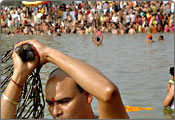

Popularly known as “Paradise on earth”, the state of Jammu and Kashmir is rich in cultural heritage. The fairs and festivals of the state are a reflection of this diverse cultural and social heritage. It celebrates all Hindu, Muslim or Sikh fairs and festivals with full vigor and enthusiasm regardless of the religion. Like all parts of India, Jammu & Kashmir also celebrates Diwali (Hindu festival, famous for fireworks, crackers and sweets), Holi (Hindu festival, famous for colours and sweets), Eid (Muslim festival, that marks the end of Ramzan, the Islamic holy month of fasting) and other major festivals.
A few other occasions are:
Makar Sankranti (known as Pongal in South India and Lohri in Punjab)
This is celebrated on January 13 of every year, to welcome the spring . People bathe in the holy rivers and perform Hawans and Yagnas (Hindu worship activities) in the temples. In the rural areas, boys visit newly-wedded couples to ask gifts according to the traditional customs. If you visit Jammu & Kashmir during Makar Sankranti, you will also be able to see the traditional “Chajja”, a dance which is performed by young boys to the drum-beats, decorated colored paper and flowers.
Baisakhi (celebrated on April 13 or 14)
Considered an auspicious occasion for marriages, the festival of Baisakhi is basically the harvest festival of northern India. The name of the festival is derived from the first month of the Hindu/Vikram calender, i.e. “Vaishakh”. Devotees take ritual dips in the holy rivers and welcome the new year with full warmth. It has a special significance for the Sikhs, as their tenth Guru, Gobind Singhji formed the Khalsa sect on the same day in 1699. Listening to Kirtans, offering prayers in Gurudwaras (worship place for the Sikhs), holding Langar (common kitchen) and watching Bhangra (traditional Sikh/Punjabi dance) are the major attractions of this festival.
Purmandal Mela
The major attraction of this fair is the wedding ceremony of Lord Shiva with Goddess Parvati. It is celebrated on the occasion of Maha Shivratr which falls in the month of February or March. It is held in Purmandal town, which is located around 39 km from Jammu city. If you visit Jammu region during Shivratri, you can see the colourful celebration all around, especially at Peer Khoh, the Ranbireshwar Temple and the Panjbhaktar Temple.
Jhiri Mela
This fair is held in the village of Jhiri, 14 km from Jammu. It is celebrated in memory of a simple, God-loving and honest farmer Baba Jitu, who committed suicide to protest against the unfair demands of the cruel landlord regarding his crop. His followers congregate at Jhiri on the appointed day from every corner of North India in the month of October or November. People revere him for his compassion, courage and honesty, and an annual fair is held in his honor.
Food And Craft Mela
This traditional fair is organized by Jammu & Kashmir Tourism during Baisakhi, at the scenic Mansar Lake (around 60 km from Jammu). The fair lasts for three days and people visit this fair for the special handicrafts, unique arts and cuisine of the state.
Apart from all these celebrations, the state of Jammu and Kashmir is known for Bahu Mela (held at the Kali Temple in Bahu Fort; twice a year: Mar-Apr and Sept-Oct), Chaitre Chaudash (celebrated at Uttar Behni about 25 km from Jammu in Mar-Apr), Navratri (nine day fasting of the Hindus for goddess Durga), Hemis Festival (a religious fair marked by masked dances and other festivities) and so on. Jammu & Kashmir celebrates one or the other festival/occasion almost every month. So, anytime you visit the place, you are likely to experience a traditional and cultural activity of the local people that is totally distinctive from the rest of India.